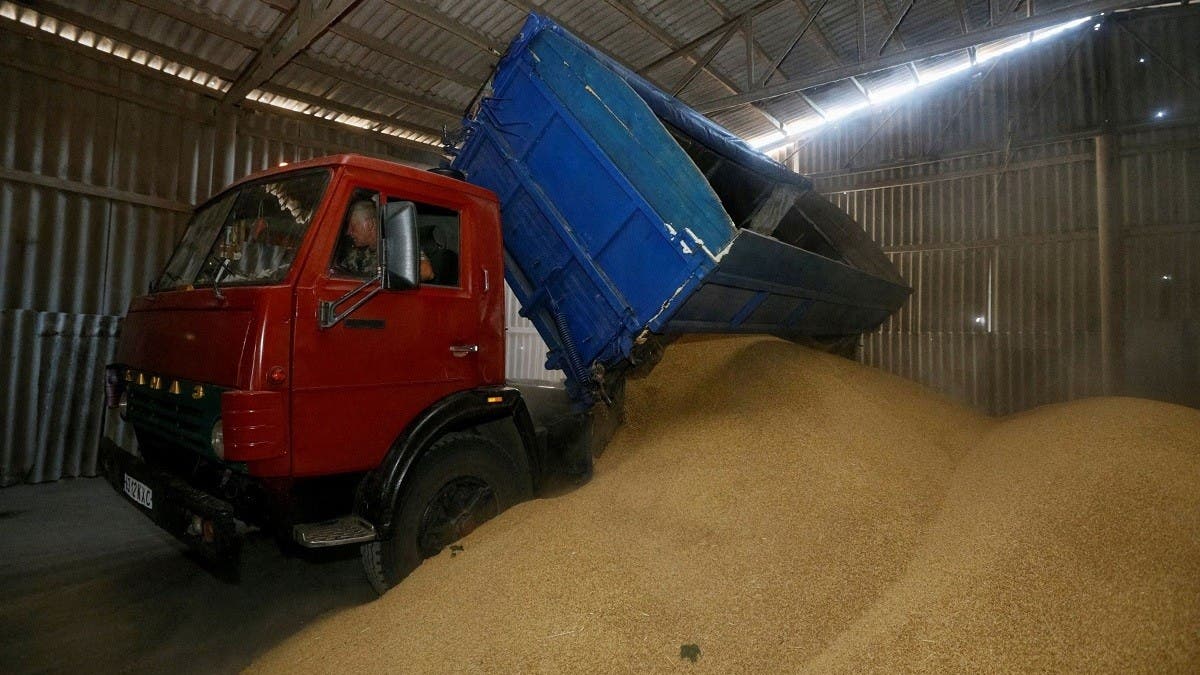At Oleksandr Peretiatko’s farm in central Ukraine, the harvest is just days away. In normal times, the crops would be sent off to ports on the Black Sea for export around the world.
This year, Peretiatko’s freshly cut grain will be stuffed instead into massive polymer silo bags snaking across the 5,000 hectares (12,000 acres) of farmland — because there’s nowhere else to put it.
For the latest headlines, follow our Google News channel online or via the app.
From a dramatic loss of export revenue to mine-riddled fields and exploding machinery, Russia’s invasion has taken a massive toll on Ukraine’s agriculture sector. Now, with ports remaining closed despite international efforts to reach a deal, harvests are getting underway with silos still loaded with last year’s crops.
Farmers are searching for alternatives to store the growing stockpiles while already worrying about how much they’ll be able to plant for the 2023 season. That means Ukraine’s ability to supply the world with much-needed grain may be limited even once ports reopen — production is already expected to be sharply lower this year.
Grain quality and yields would also suffer if crops are left longer in fields because of a lack of storage.
“We’ll dream next year about the problems we’re facing right now,” said Dmitry Skornyakov, chief executive of HarvEast, which farms in eastern and northern Ukraine. “Because next year’s problems, trust me, will be much, much worse.”
Ukraine was among the biggest exporters of wheat, corn and sunflower oil before the invasion, and the shut-off of supplies sent shockwaves through global agriculture markets, helping stoke food prices to a record and raising concerns about hunger around the world.
Ukraine’s government expects grain production to fall about 40 percent versus 2021, after farmers lacked fertilizer or left land unsown. Even so, it’s carrying a backlog of 20 million tons into the season that starts next month.
A fifth of its grain elevators have also been damaged or lost to territory occupied by Russian forces, according to Ukraine’s agriculture minister. That could leave farmers short of 10 to 15 million tons of storage by October.
Some crops are now flowing out of the country via rail, road and river, but the routes are lengthy and wait times long. Ukraine’s wheat exports typically peak just after harvest and neighboring EU nations will be contending with their own crops at the same time, overwhelming logistics.
“It’s long, difficult, expensive — a very big problem,” Skornyakov said. “In a month, we’ll get the new harvest. And I expect that it will become even worse.”
His company has been battered by Russia’s attacks. Of the 127,000 hectares HarvEast farmed before the war, about 80,000 are in occupied areas. Another 9,000 hectares nearer Kyiv were riddled by mines, and half wasn’t cleared in time to be seeded. A tractor exploded in one field.
On what’s still under its control, harvests of wheat and peas are nearing. The company has used silo bags for the past decade, and will rely on them more than normal. Twenty to thirty percent of its crops were often sold directly from the field, an unfeasible prospect this season.
Ukraine should have room to store crops like wheat and barley, which are first to be harvested in summer, said Petro Melnyk, president of the Ukrainian Agribusiness Club. The bigger crunch lies in autumn for later-collected crops like corn.
Silo bags — which some farmers like him have used for several years — will undoubtedly help. Still, they won’t absorb the whole surplus and growers also need capacity to clean and dry grain, he said.
Plus, they can’t be used for some key crops like sunflowers, according to Skornyakov. The Ukrainian Grain Association said corn might be left longer in the fields, which could hurt quality and yields.
Ukraine has asked European partners for help preserving its next crops. Mobile storage could add 15 million tons of capacity, its prime minister said. Other allies also pledged assistance, with US President Joe Biden saying it will build temporary silos in bordering nations like Poland.
Ukraine agribusiness company IMC has teamed up with other farms to ship in silo bags from Brazil, said chief executive Alex Lissitsa. Its elevators usually clear out in June, preparing to restock with the nearing wheat harvest. This year, they’ll still hold about 200,000 tons of last year’s corn, a third full.
Without a sales pickup soon, farmers will have less funds to secure seed and inputs for winter-grain plantings that kick off as soon as August. Any production cutbacks could exacerbate tight world supplies even longer.
“That’s the beginning of the real global food crisis,” he said.
Read more:
Food security was ‘deteriorating’ before Ukraine war, but has worsened since: Expert
Russia ready to set up corridor for ships carrying food to leave Ukraine: Ifax
Nearly 25 million tons of grain stuck in Ukraine, says UN food agency

 World2 years ago
World2 years ago
 World2 years ago
World2 years ago
 Entertainment7 years ago
Entertainment7 years ago
 World7 years ago
World7 years ago
 Entertainment7 years ago
Entertainment7 years ago






